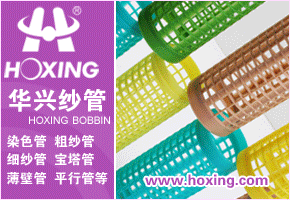Global Organic Textile Standard (GOTS) Updated
The International Working Group on Global Organic Textile Standard (GOTS IWG) today announced the release of Version 3.0 of its organic fiber processing standard. Revisions include a prohibition on garment finishing methods considered harmful to workers (such as denim sand blasting), a requirement that any polyester in GOTS-certified products be made of post-consumer recycled material by 2014, permission for polypropylene to be used as an 'additional fiber material,' and more material options for accessories. In addition, the previous total ban on all chemical fabric finishes has been lifted; thus, most fabric finishes are now permitted but only if they meet the stringent general GOTS toxicity criteria.
Version 3.0 also requires that water and energy use reduction goals are developed and monitored and that social compliance management plans be put into place which will ensure that minimum social criteria are met. All companies wishing to be GOTS-certified must fully comply with Version 3.0 by March 1, 2012.
"The changes in Version 3.0 should enable suppliers to develop and offer GOTS-certified apparel and home textile products with performance properties that are expected by consumers, yet meet the demanding - and even tightened - chemical input toxicity criteria put in place to protect workers and the environment," said Marcus Bruegel, GOTS Technical Director. "Such practical requirements are technically achievable even in large scale industrial textile production and for mass market brands and retailers," he added.
The new version is the result of an extensive stakeholder input process in which organizations from around the world with expertise in organic production, textile processing, and social criteria participated in order to define strict verifiable environmental and social criteria throughout the entire apparel and home textile processing chain (including spinning, knitting, weaving, dyeing, finishing, manufacturing, and trading).
Key GOTS provisions already in place include a ban on the use of genetically modified organisms (GMOs), highly hazardous chemicals such as azo dyes and formaldehyde, and child labor, while requiring living wages and strict waste water treatment practices. At least 95 percent of the fibers must be certified organic for label grade 'organic' and 70 percent for label grade 'made with organic.' GOTS was established in 2006 with guidelines announced in 2008.
2010 was a busy year for the GOTS IWG. To provide visual background about GOTS, the IWG released the film "The Global Organic Textile Standard - Ecology and Social Responsibility" in countries around the world on October 6, 2010. The film highlights the huge environmental impact of the conventional textile production and how companies getting certified to GOTS can reduce this impact while also addressing important social concerns. A short trailer for the film can be seen at http://global-standard.org/information-centre/gotsfilm.html and copies in different languages can be ordered there by textile companies, educational institutions, and relevant organizations at no cost.
According to the GOTS IWG public data base of facilities certified to GOTS, launched in early 2010, approximately 1500 companies with a total of 2,754 facilities in 54 countries around the world were certified to the organic apparel and textile standard by the end of 2010. The top twenty countries based on the number of GOTS-certified facilities are (in order of ranking): India, Turkey, China, Pakistan, South Korea, Japan, Germany, Italy, United Kingdom, Bangladesh, France, Hong Kong, Mauritius, Peru, USA, Netherlands, Sri Lanka, Portugal, Greece, and Belgium. Countries in which facilities were certified to GOTS for the first time in 2010 included Finland, the Lao People's Democratic Republic, Latvia, Macedonia, Sweden, and Uganda.
The database has already received more than 120,000 search requests. It includes almost 400 dyeing facilities, more than 200 spinning, knitting, and weaving units, and approximately 140 printing and manufacturing facilities. While more than 700 companies are listed with an export business, currently about 50 import operations hold GOTS certificates as well. Thirteen independent certification organizations around the world are qualified to certify operations to the standard (one more than in 2009).
The GOTS IWG is made up of the Organic Trade Association (U.S.), Japan Organic Cotton Association, International Association Natural Textile Industry (Germany), and the Soil Association (UK). In late 2010, the IWG appointed regional representatives worldwide to drive an increase in the awareness of and certification to GOTS. The representatives so far are: Yoshiko Ikoma (Japan), Claudia Kersten (Austria, Germany, Switzerland), Sandra Marquardt (U.S./Canada), Christopher Stopes (Great Britain), and Elisabeth Tosti (Scandinavia).
"With the launch of our online database of GOTS-certified facilities, the appointment of regional representatives, and the development of the GOTS film, 2010 was a big year," said Herbert Ladwig, Coordinator of the GOTS International Working Group. "With the launch of Version 3.0 and the work of our new regional representatives, we expect substantial increased interest in GOTS in 2011," he noted.
Global retail sales of organic cotton apparel and home textile products reached an estimated $4.3 billion in 2009, according to Textile Exchange.







